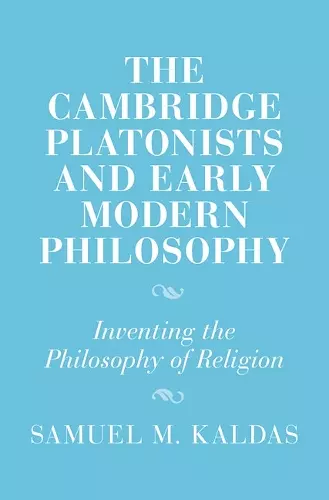The Cambridge Platonists and Early Modern Philosophy
Inventing the Philosophy of Religion
Format:Hardback
Publisher:Cambridge University Press
Published:16th May '24
£85.00
Supplier delay - available to order, but may take longer than usual.

Samuel M. Kaldas' study explores the development and influence of the early modern philosophers known as the Cambridge Platonists.
The seventeenth-century philosophers known as the Cambridge Platonists were recognised in their time as some of England's most influential and controversial philosophers. In this study, Samuel M. Kaldas explores the intellectual contributions of the group, which serve as the foundation for the modern field of philosophy of religion.Often neglected by historians today, the seventeenth-century philosophers known as the Cambridge Platonists were recognised in their time as some of the most influential and controversial philosophers in England. Whereas most studies of the Cambridge Platonists have discussed their later careers, this book focuses on their early, formative years at Cambridge during the English Civil Wars. Samuel M. Kaldas explores how the Cambridge Platonists addressed issues central to philosophy of religion as we know it today through their engagement with early seventeenth-century religious controversies about predestination, the character and nature of God, and the role of reason in religion. His study serves as an accessible introduction to both the Cambridge Platonists, and to English religious controversies that contributed to the birth of the modern philosophy of religion. At the same time, Kaldas provides context for and fresh insights into the Cambridge Platonists' intellectual development and the coherence of their thought.
'In this new book, Samuel Kaldas takes further the growing demonstration that the Cambridge Platonists were intellectual pioneers and not laggards. They were neither marginal at the time, nor in the later history of modern philosophy and theology, of which they were partial architects. Usefully describing the differences between its key exponents, Kaldas nonetheless shows how what they had in common was the sustaining of a Renaissance Christian Platonic tradition within English Protestantism, including an ethics of sympathy and generosity, in antithesis to Calvinist doctrines of an arbitrary and tyrannical God. This sustaining allowed theology to stay close to philosophy in a manner that resonates later on through variants of Pietism and Romanticism to the debates of our own era.' Catherine Pickstock, University of Cambridge
'That brilliant generation of philosophers and theologians whom we collectively call the Cambridge Platonists arrived at a golden moment in the history of British thought-arguably its high meridian-and yet their achievements are little appreciated and even less studied in the aftermath of the ascendancy of the analytic tradition. They deserve immeasurably more attention and serious study than they typically receive, and Samuel Kaldas's book is an exemplary attempt to correct the oversight.' David Bentley Hart, University of Notre Dame
'Dr Kaldas expounds the historical context in which a group of Cambridge intellectuals challenged the foundations of 17th Century Reformed Theology – especially such doctrines as double predestination, and the unconstrained authority of God to demand whatever He pleased. A very valuable resource for scholars and philosophers alike.' Stephen R. L. Clark, University of Liverpool
'Kaldas's work should be read by historians of modern philosophy as well as by philosophers and theologians interested in the relation of faith and reason, the goodness and will of God, and religious epistemology.' Charles Taliaferro, Religious Studies Review
ISBN: 9781009426916
Dimensions: 235mm x 158mm x 25mm
Weight: 630g
330 pages